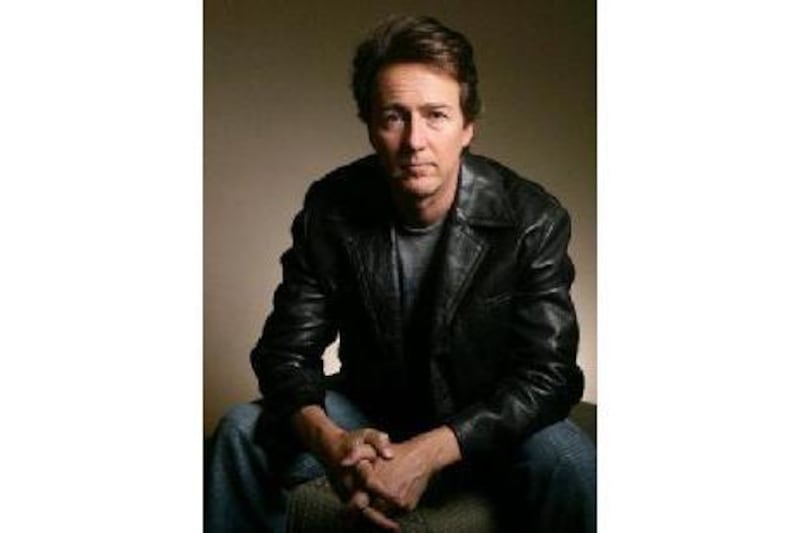Edward Norton talks to Matt Mueller about his compelling on-screen psychological duel with Robert De Niro in Stone, which goes on general release in UAE theatres today
The first time Edward Norton and Robert De Niro worked together, in 2001, the results weren't hugely impressive. Frank Oz's old-fashioned heist drama The Score was notable for wrangling Norton (then riding high with two Oscar nominations in his first six films), De Niro and Marlon Brando into one film, but has passed into history as a fairly anonymous entry on all of their résumés, in particular lacking a memorable dynamic between the two younger stars. Their new collaboration Stone, on the other hand, hinges entirely on the pair's face-to-face encounters, as De Niro's repressed, passive-aggressive parole officer Jack Mabry ends up pulling Norton's manipulative convict Stone as one of his last cases. The results make for a compelling on-screen psychological duel.
Sparring with each other over Mabry's rickety desk, their many scenes together are the buzz moments in John Curran's drama, which traces one man's questioning of his supposedly rock-solid Christian faith and the other's spiritual conversion to a new-age philosophy. Both actors are on top form, as is Milla Jovovich as Stone's seductive wife Lucetta, who works her charms on Jack to help her husband's cause. "I love working with Bob," Norton told me at the Toronto Film Festival. "He can be deceiving because he doesn't break the wall. He doesn't go: 'Let's hang around and chit-chat,' he just leaves you to do your own thing. But he'll only respect the script as far as he feels it's being true. If the scene isn't forcing him towards where he's supposed to go, then he won't go there. In essence, he makes you earn it, he makes the scene earn it, and that's what I love about him."
Despite having had a very good experience working with Curran on the 2006 adaptation of Somerset Maugham's The Painted Veil, Norton wasn't all that keen when the director first approached him with Stone, finding the title character too weakly sketched. But apart from another chance to work with De Niro, he was won over by Curran's thematic take on the paradox of people who have structured their lives around an organised religion and yet feel disconnected and hollow, counterpointed against someone with no spiritual grounding who undergoes a dramatic conversion.
"I liked that John was interested in exploring the different kinds of imprisonment and liberation that people go through," says the actor, "but resisting putting any kind of imposed message about religion in there." Furthermore, the idea of a supposedly devout man who stands in judgement while being hypocritical in terms of his own ideals is, says Norton, "very resonant in America right now".
At the age of 41, Norton finds himself at an interesting crossroads in his career. His talent remains unquestioned and most of the projects he tends to choose these days are independent in both funding and spirit. At the same time, though, he almost seems to be distancing himself from the industry, turning his focus towards personal issues by becoming a celebrity eco-warrior for conservation and sustainable development (he was appointed a UN goodwill ambassador for biodiversity this summer).
Whereas once his riveting turns in the likes of Primal Fear, American History X and Fight Club had him being hailed as the greatest actor of his generation, and long-term relationships with Courtney Love and Salma Hayek kept his name in the spotlight, neither seems to be a priority any longer.
Perhaps he's been burned once too often. He endured a particularly excruciating public humiliation earlier this year when he was unceremoniously dumped from The Avengers, a franchise film due to bring together Marvel's various superhero characters under the umbrella of one film. Norton famously clashed with Marvel during production on his 2008 rendition of The Incredible Hulk, but the way the comic-book studio announced its decision to jettison Norton by declaring it wanted to find an actor "who embodies the creativity and collaborative spirit of our other talented cast members" was a low blow in an industry averse to washing its dirty linen in public.
Norton insists he doesn't bear any grudges, though, and claims the publicity blowback was far worse for them than him. But while agreeing that Marvel's declaration was "low and unprofessional", he says it won't be keeping him up at nights. "How could I get anxious over something like that?" he says. "I couldn't ask for a more blessed position, I don't have anything to prove to anybody so I want to work when it's with people that I love and respect. Other than that, I've got plenty of other things in my life to be getting on with."










